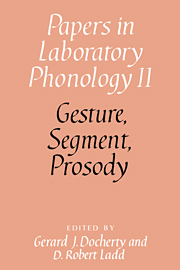Book contents
- Frontmatter
- Contents
- List of contributors
- Acknowledgments
- Introduction
- Section A Gesture
- Section B Segment
- 6 An introduction to feature geometry
- 7 The segment: primitive or derived?
- 8 Modeling assimilation in nonsegmental, rule-free synthesis
- 9 Lexical processing and phonological representation
- 10 The descriptive role of segments: evidence from assimilation
- 11 Psychology and the segment
- 12 Trading relations in the perception of stops and their implications for a phonological theory
- Section C Prosody
- Appendix 1 The test phrases (bold type) of experiment 1 in the context in which they were read
- Appendix 2 The distractors (bold type) of experiment 1 in the context in which they were read
- Appendix 3 The test sentences of experiment 2. The test words are in bold type
- Appendix 4 The distractor sentences of experiment 2. The distractors are in bold type
- References
- Name index
- Subject index
11 - Psychology and the segment
from Section B - Segment
Published online by Cambridge University Press: 18 December 2009
- Frontmatter
- Contents
- List of contributors
- Acknowledgments
- Introduction
- Section A Gesture
- Section B Segment
- 6 An introduction to feature geometry
- 7 The segment: primitive or derived?
- 8 Modeling assimilation in nonsegmental, rule-free synthesis
- 9 Lexical processing and phonological representation
- 10 The descriptive role of segments: evidence from assimilation
- 11 Psychology and the segment
- 12 Trading relations in the perception of stops and their implications for a phonological theory
- Section C Prosody
- Appendix 1 The test phrases (bold type) of experiment 1 in the context in which they were read
- Appendix 2 The distractors (bold type) of experiment 1 in the context in which they were read
- Appendix 3 The test sentences of experiment 2. The test words are in bold type
- Appendix 4 The distractor sentences of experiment 2. The distractors are in bold type
- References
- Name index
- Subject index
Summary
Something very like the segment must be involved in the mental operations by which human language users speak and understand. Both processes–production and perception – involve translation between stored mental representations and peripheral processes. The stored representations must be both abstract and discrete.
The necessity for abstractness arises from the extreme variability to which speech signals are subject, combined with the finite storage capacity of human memory systems. The problem is perhaps worst on the perceiver's side; it is no exaggeration to say that even two productions of the same utterance by the same speaker speaking on the same occasion at the same rate will not be completely identical. And within-speaker variability is tiny compared to the enormous variability across speakers and across situations. Speakers differ widely in the length and shape of their vocal tracts, as a function of age, sex, and other physical characteristics; productions of a given sound by a large adult male and by a small child have little in common. Situation-specific variations include the speaker's current physiological state; the voice can change when the speaker is tired, for instance, or as a result of temporary changes in vocal-tract shape such as a swollen or anaesthetized mouth, a pipe clenched between the teeth, or a mouthful of food. Other situational variables include distance between speaker and hearer, intervening barriers, and background noise.
- Type
- Chapter
- Information
- Gesture, Segment, Prosody , pp. 290 - 295Publisher: Cambridge University PressPrint publication year: 1992



